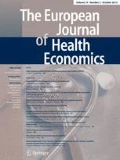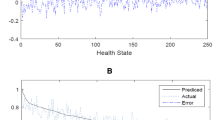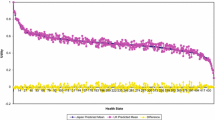Abstract
Background
Valuations of preference-based measure such as EQ-5D and/or SF6D have been conducted in different countries. There is potential to borrow strength from existing countries’ valuations to generate better representative utility estimates. This is explored using two case studies modelling UK data alongside Japan samples to generate Japan estimates.
Methods
Data from two SF-6D valuation studies were analyzed, where using similar standard gamble protocols, values for 241 and 249 states were devised from representative samples of Japan and UK general adult populations, respectively. Two nonparametric Bayesian models were applied to estimate a Japan value set, where the UK results were used as informative priors in the first model and subsets of the Japan data set for 25 and 50 health states were modelled alongside the full UK data set in the second. Generated estimates were compared to a Japan value set estimated using Japan values alone using different prediction criterion.
Results
The results allowed the UK data to provide significant prior information to the Japan analysis by generating better estimates than using Japan data alone. Also, using Japan data elicited for 50 health states alongside the existing UK data produces roughly similar predicted valuations as the Japan data by itself.
Conclusion
The promising results suggest that the existing preference data could be combined with data from a valuation study in a new country to generate preference weights, thus making own country value sets more achievable for low–middle income countries. Further research and application to other countries and preference-based measures are encouraged.



Similar content being viewed by others
References
Drummond, M.F., Sculpher, M.J., Torrance, G.W., O’Brien, B.J., Stoddart, G.L.: Methods for the economic evaluation of health care programmes. Oxford Medical Publications, Oxford (2005)
Brooks, R., Group E: EuroQol: the current state of play. Health Policy 37, 53–72 (1996)
Torrance, G.W., Feeny, D.H., Furlong, W.J., Barr, R.D., Zhang, Y., Wang, Q.: Multiattribute utility function for a comprehensive health status classification system: health utilities index mark 2. Med. Care 34, 702–722 (1996)
Feeny, D., Furlong, W., Torrance, G.W., Goldsmith, C.H., Zhu, Z., DePauw, S., Boyle, M.: Multiattribute and single-attribute utility functions for the health utilities index mark 3 system. Med. Care 40, 113–128 (2002)
Hawthorne, G., Richardson, J., Day, N.A.: A comparison of the Assessment of Quality of Life (AQoL) with four other generic utility instruments. Ann. Med. 33, 358–370 (2001)
Kaplan, R.M., Anderson, J.P.: A general health policy model: update and application. Health Serv. Res. 23, 203–235 (1988)
Brazier, J., Roberts, J., Deverill, M.: The estimation of a preference-based measure of health from the SF-36. J. Health Econ. 21, 271–292 (2002)
Revicki, D.A., Leidy, N.K., Brennan-Diemer, F., Sorensen, S., Togias, A.: Integrating patient preferences into health outcomes assessment: the multiattribute Asthma Symptom Utility Index. Chest 114, 998–1007 (1998)
Rowen, D., Brazier, J., Ara, R., Zouraq, I.A.: The role of condition-specific preference-based measures in health technology assessment. Pharmacoeconomics 35, 33–41 (2017)
Badia, X., Roset, M., Herdman, M., Kind, P.: A comparison of United Kingdom and Spanish general population time trade-off values for EQ-5D health states. Med. Decis. Making 21, 7–16 (2001)
Johnson, J.A., Luo, N., Shaw, J.W., Kind, P., Coons, S.J.: Valuations of EQ-5D health states: are the United States and United Kingdom different? Med. Care 43, 221–228 (2005)
Kharroubi, S.A., O’Hagan, A., Brazier, J.E.: A comparison of United States and United Kingdom EQ-5D health states valuations using a nonparametric Bayesian method. Stat. Med. 29, 1622–1634 (2010)
Kharroubi, S.A., Brazier, J., McGhee, S.: A comparison of Hong Kong and United Kingdom SF-6D health states valuations using a non-parametric Bayesian method. Value Health 17, 397–405 (2014)
Kharroubi, S.A.: A Comparison of Japan and UK SF-6D health-state valuations using a non-parametric Bayesian method. Appl. Health Econ. Health Policy 13, 409–420 (2015)
Kharroubi, S.A.: Valuations of EQ-5D health states: could United Kingdom results be used as informative priors for United States. J. Appl. Stat. 45, 1579–1594 (2018)
Kharroubi, S.A.: Valuation of preference-based measures: Can existing preference data be used to generate better estimates? Health Qual. Life Outcomes 45, 1579–1594 (2018)
Chan, K.K.W., Xie, F., Willan, A.R., Pullenayegum, E.M.: Conducting EQ-5D valuation studies in resource-constrained countries: the potential use of shrinkage estimators to reduce sample size. Med. Decis. Making 38(1), 26–33 (2018)
Kharroubi, S.A., Rowen, D.: Valuation of preference-based measures: can existing preference data be used to select a smaller sample of health states? Eur. J. Health Econ. 20(2), 245–255 (2018)
Ware, J.E., Jr., Sherbourne, C.D.: The MOS 36-item short-form health survey (SF-36): I. Conceptual framework and item selection. Med. Care 30, 473–483 (1992)
Patrick, D.L., Starks, H.E., Cain, K.C., Uhlmann, R.F., Pearlman, R.A.: Measuring preferences for health states worse than death. Med. Decis. Making 14, 9–18 (1994)
Brazier, J.E., Fukuhara, S., Roberts, J., Kharroubi, S., Yamamoto, Y., Ikeda, S., Kurokawa, K.: Estimating a preference-based index from the Japanese SF-36. J. Clin. Epidemiol. 62, 1323–1331 (2009)
Kharroubi, S.A., O’Hagan, A., Brazier, J.E.: Estimating utilities from individual health preference data: a nonparametric Bayesian method. J. Roy. Stat. Soc. Ser. C (Appl. Stat.) 54, 879–895 (2005)
Yang, Z., Luo, N., Bonsel, G., Busschbach, J., Stolk, E.: Effect of health state sampling methods on model predictions of EQ-5D-5L values: small designs can suffice. Value Health 22(1), 38–44 (2019)
Bland, J.M., Altman, D.: Statistical methods for assessing agreement between two methods of clinical measurement. Lancet 327, 307–310 (1986)
Kharroubi, S.A., Beyh, Y., ElHarake, M., Dawoud, D., Rowen, R., Brazier, J.: Examining the feasibility and acceptability of valuing the Arabic version of SF-6D in a Lebanese population. Int. J. Environ. Res. Public Health 17(3), 1037 (2020)
Kharroubi, S.A., McCabe, C.: Modelling HUI 2 health state preference data using a nonparametric Bayesian method. Med. Decis. Making 28, 875–887 (2008)
Kharroubi, S.A., Brazier, J., Yang, Y.: Modelling a Preference-Based Index for two condition specific measures (asthma and overactive bladder) using a nonparametric Bayesian method. Value Health 17, 406–415 (2014)
Acknowledgements
The authors would like to thank the National Council for Scientific Research in Lebanon and the University Research Board at the American University of Beirut for funding this study. The authors would particularly like to thank Professor John Brazier, who was investigator in the original SF-6D valuation survey, for giving them the permission to reuse the data.
Funding
This study was funded by the National Council for Scientific Research in Lebanon and the University Research Bureau at the American University of Beirut, Lebanon.
Author information
Authors and Affiliations
Corresponding author
Ethics declarations
Ethics approval and consent to participate
Secondary publicly available data were used in this study.
Consent for publication
Not applicable.
Availability of data and material
Publicly available data sets have been used for this study.
Conflict of interest
The authors declare that they have no competing interests.
Additional information
Publisher's Note
Springer Nature remains neutral with regard to jurisdictional claims in published maps and institutional affiliations.
Rights and permissions
About this article
Cite this article
Kharroubi, S.A., Beyh, Y. Bayesian modeling of health state preferences: could borrowing strength from existing countries’ valuations produce better estimates. Eur J Health Econ 22, 773–788 (2021). https://doi.org/10.1007/s10198-021-01289-x
Received:
Accepted:
Published:
Issue Date:
DOI: https://doi.org/10.1007/s10198-021-01289-x




